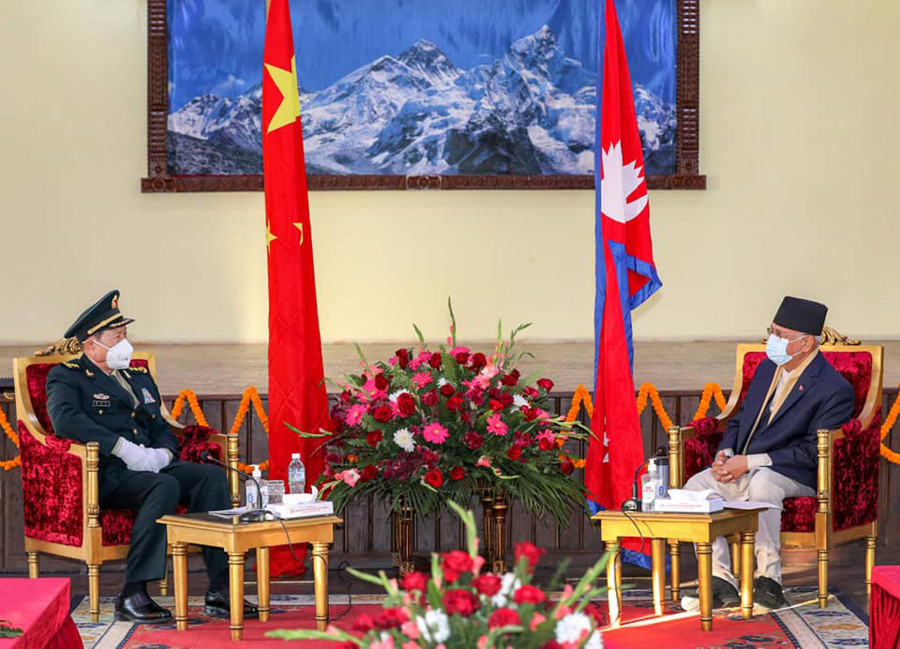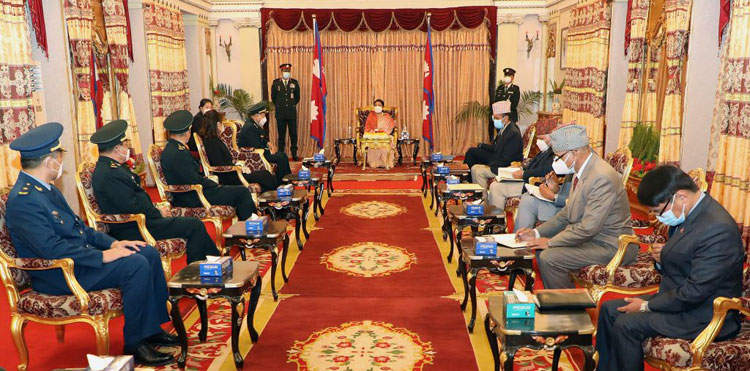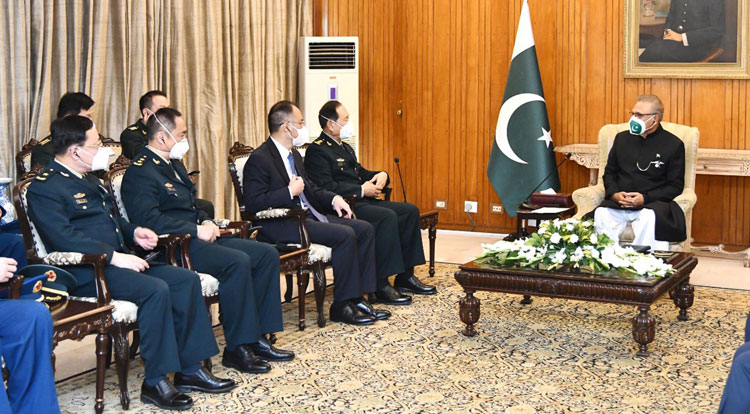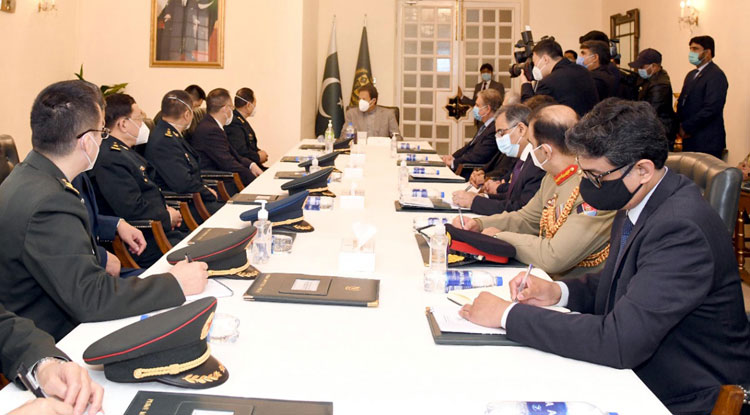INDIAN ARMED FORCES CHIEFS ON
OUR RELENTLESS AND FOCUSED PUBLISHING EFFORTS

SP Guide Publications puts forth a well compiled articulation of issues, pursuits and accomplishments of the Indian Army, over the years

I am confident that SP Guide Publications would continue to inform, inspire and influence.

My compliments to SP Guide Publications for informative and credible reportage on contemporary aerospace issues over the past six decades.
- Prime Minister witnesses 'Bharat Shakti' – a Tri-Services Firing and Manoeuvre Exercise in Pokhran, Rajasthan
- Interim Defence Budget 2024-25 — An Analysis
- Union Defence budget 2024
- Prime Minister Modi Commemorates Indian Navy Day in a Grand Ceremony
- Prime Minister Modi Flies in the LCA Tejas
- New Chapter in India-Italy Defence Ties
- Airpower beyond Boundaries
Snubs and Hug for Wei Fenghe
 |
The Author is Former Director General of Information Systems and A Special Forces Veteran, Indian Army |

Chinese Defence Minister General Wei Fenghe received mixed responses during his recent visit to Nepal, Bangladesh and Pakistan during November 2020. Wei commenced his foreign tour with a day-long visit to Nepal where he was the highest ranking Chinese official to visit Nepal after President Xi Jinping’s during October 2019. In October 2019 Nepal’s then Defence Minister Ishwar Pokhrel had also visited Beijing where he, according to Chinese media, signed a 150 million yuan ($22.8 million) deal on military assistance. However, Nepalese Prime Minister K.P. Sharma Oli has since taken over the defence portfolio himself, leaving Ishwar Pokhrel without any portfolio.
During his visit recent visit to Nepal, Wei had planned to have a bilateral discussion with the Nepalese defence minister, which meant Prime Minister Oli. However, much water has flown under the bridge since Xi Jinping’s visit and dynamics of the region are in flux with possible split in Nepal’s Communist Party and Nepalese public, aware of China’s cartographic aggression despite government denials. Wei, therefore was only granted a courtesy call on President Bidya Devi Bhandari and Prime Minister K.P. Sharma Oli.
The Chinese embassy in Kathmandu had planned a lunch in which all the former foreign ministers and defence ministers of Nepal were to be invited. However, this too was cancelled after reservation expressed by the Nepaese government over such an event. For the bilateral on defence issues, Wei had to settle for discussions with the Nepal’s Army Chief General Purna Chandra Thapa, which was a snub considering the international protocols. Wei also was not granted any meetings with the top leaders of political parties of Nepal, much that he wanted to for promoting Chinese interests. China came out with a statement by Wei saying “we firmly support Nepal to safeguard its territorial integrity” but Nepalese media gave low coverage to the visit.

Wei’s next stop was supposed to be Bangladesh. It is not possible that the visit was not planned well in advance. But interestingly a tweet from Bangladesh on November 29 read, “Chinese Defence Minister is coming to Bangladesh on a surprise visit tomorrow. He will meet Bangladesh high level defence officials and other respective authorities for strengthening the bilateral defence relations with Bangladesh”. The bit about “surprise visit” and “other respective authorities” gives the impression that Bangladesh perhaps asked Wei to call off the visit for reasons best known to them and to convey a message. Both Bangladesh and China cited no official reason for Wei postponing his visit to Bangladesh. Bangladesh Minister for Foreign Affairs A.K. Abdul Momen is reportedly in quarantine on account of COVID-19 but then in Nepal Wei did not even seek a meeting with Nepalese Foreign Minister Pradeep Kumar Gyawali.
Hence instead of flying from Kathmandu to Dhaka, Wei had to fly to Islamabad which would have been a relief considering that Pakistan is Beijing’s home turf. In Pakistan, Wei who is also State Councilor (as every Chinese official appears to be) met Pakistan President Arif Alvi and Prime Minister Imran Khan.

Alvi reportedly said that Pakistan and China are good friends who have enjoyed a traditional friendship of long history and mutual trust. Pakistan firmly supports China's stand on issues related to the South China Sea, Taiwan, Xinjiang, Tibet and so on. Chinese media quoted Alvi saying, "We hope that the two countries will further strengthen cooperation in the construction of the China-Pakistan Economic Corridor (CPEC), as well as the defence and security fields.” Imran said Wei's visit was of great significance in the context of the global pandemic, which shows the firm support of the Chinese government and military to Pakistan.
According to Pakistani media, Wei called on Pakistan’s Chief of the Army Staff General Qamar Javed Bajwa at the General Headquarters, and both discussed “matters of mutual interest, regional security and enhanced bilateral defence collaboration”. The amusing part is that nowhere there is mention of Pervez Khattak, Pakistan’s Defence Minister unless he was quietly taking notes about what Wei and Bajwa were discussing. This is not surprising since Bajwa calls the shots and even Imran must kowtow to him.
Wei called for scaling-up the very close military ties between China and Pakistan to a "higher level" to jointly deal with "risks and challenges" faced by the two countries, saying, "We should push the military-to-military relationship to a higher level, so as to jointly cope with various risks and challenges, firmly safeguard the sovereignty and security interests of the two countries, and safeguard the regional peace and stability."

During their meeting, Wei and Bajwa exchanged in-depth views on the international and regional situations, the relations between the two countries and militaries, the equipment and technology cooperation and other issues, according to Chinese media with Wei calling the China-Pakistan all-weather strategic cooperative partnership unique in the world and adding that “under the leadership of the heads of the two countries, the two sides have continuously strengthened cooperation in various fields and firmly supported each other on issues involving each other's core interests.” He also said, "China is willing to strengthen strategic communication, enhance strategic mutual trust and strengthen strategic cooperation with Pakistan.”
An important feature of Wei’s visit was a signing of a new memorandum of understanding (MoU) with Pakistan to boost their already close military relations. Details of this new MoU between the two militaries have been kept under wraps but it follows another agreement signed last year, when China’s Vice-Chairman of the Central Military Commission (CMC) General Xu Qiliang visited Rawalpindi for defence cooperation and “capacity building of the Pakistan Army”.
Of concern should be not only the unholy nexus of China-Pakistan promoting terror but the sinister turn it is taking. China’s Wuhan Institute of Virology has supplied Pakistan with the reagents for Bacillus Thuringiensis and the above joint China-Pakistan project has conducted successful soil sampling tests to isolate Bacillus Thuringiensis (BT), which has a striking similarity to Bacillus Anthracis or Anthrax. The Wuhan lab is providing extensive training on manipulation of pathogens and bio-informatics to Pakistani scientists for developing indigenous virus collection database. The agreement also states that the collaboration is not necessarily limited to stated objectives and new thematic research to monitor potential new diseases can be added by either party. This provides the handle for developing newer deadly viruses and biological weapons.





